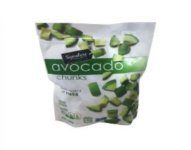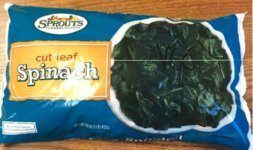FDA posted on its website that NATURE’S TOUCH FROZEN FOODS (WEST) INC. (“Nature’s Touch”) is voluntary recalling Signature Select Avocado Chunks, with a best before date of Oct 11, 20, due to potential contamination with Listeria monocytogenes. The company said it was informed by the Food and Drug Administration that a routine sampling inspection found a positive result for Listeria in one sample bag of the product. There have been no reported illnesses associated with the recalled product, which has been distributed in Alaska, Arizona, California, Colorado, Hawaii, Idaho, Nebraska, Nevada, New Mexico, Oregon, South Dakota, Washington, Wyoming, Texas, and Utah. The recalled Signature Select Frozen Avocado Chunks were distributed at Albertsons, Safeway, Safeway Community Markets, Carrs-Safeway, Eagle, Lucky, Pak N Save, Pavilions and Vons. @ https://www.fda.gov/safety/recalls-market-withdrawals-safety-alerts/natures-touch-frozen-foods-west-inc-voluntarily-recalls-signature-select-avocado-chunks-due?utm_campaign=Nature%E2%80%99s%20Touch%20Frozen%20Foods%20%28West%29%20Inc.%20Voluntarily%20Recalls%20Signature%20Select%20Avocado%20Chunks&utm_medium=email&utm_source=Eloqua
ruth
https://www.fda.gov/safety/recalls-market-withdrawals-safety-alerts/natures-touch-frozen-foods-west-inc-voluntarily-recalls-signature-select-avocado-chunks-due?utm_campaign=Nature%E2%80%99s%20Touch%20Frozen%20Foods%20%28West%29%20Inc.%20Voluntarily%20Recalls%20Signature%20Select%20Avocado%20Chunks&utm_medium=email&utm_source=Eloqua
ruth
{“post_id”:5775,”post_type”:”post”,”shortcode”:”peepso_postnotify”,”permalink”:”https:\/\/ask-bioexpert.com\/blog-post\/raw-wheat-flour-caused-several-outbreaks-of-heterogenic-escherichia-coli-infections-stec-in-the-usa-and-canada-since-the-first-outbreak-in-2009\/”}
ruth
FDA posted on its site that Sprouts Farmers Market of Phoenix, AZ recalls Frozen Cut Leaf Spinach conventional and organic 16oz bags, manufactured by National Frozen Foods of Oregon, because of potential contamination with Listeria monocytogenes. The Products were distributed to retail locations in AZ, CA, NV, UT, NM, CO, TX, KS, OK, MO, TN, AL, GA, FL, SC, NC, PA, MD, and VA. No illnesses have been reported in connection to this product to date. Random sampling by the authorities revealed that the finished products contained Listeria. Sprouts Farmers Market announced that it had removed all affected product from its retail stores. They are conducting an internal investigation with National Frozen Foods to ensure all food safety standards and being met and enforced. @ https://www.fda.gov/safety/recalls-market-withdrawals-safety-alerts/sprouts-farmers-market-recalls-frozen-cut-leaf-spinach-and-frozen-organic-cut-leaf-spinach-16oz
https://www.fda.gov/safety/recalls-market-withdrawals-safety-alerts/sprouts-farmers-market-recalls-frozen-cut-leaf-spinach-and-frozen-organic-cut-leaf-spinach-16oz
ruth
FDA posted on its site that Sprouts Farmers Market of Phoenix, AZ recalls Frozen Cut Leaf Spinach conventional and organic 16oz bags, manufactured by National Frozen Foods of Oregon, because of potential contamination with Listeria monocytogenes. The Products were distributed to retail locations in AZ, CA, NV, UT, NM, CO, TX, KS, OK, MO, TN, AL, GA, FL, SC, NC, PA, MD, and VA. No illnesses have been reported in connection to this product to date. Random sampling by the authorities revealed that the finished products contained Listeria. Sprouts Farmers Market announced that it had removed all affected product from its retail stores. They are conducting an internal investigation with National Frozen Foods to ensure all food safety standards and being met and enforced. @ https://www.fda.gov/safety/recalls-market-withdrawals-safety-alerts/sprouts-farmers-market-recalls-frozen-cut-leaf-spinach-and-frozen-organic-cut-leaf-spinach-16oz
https://www.fda.gov/safety/recalls-market-withdrawals-safety-alerts/sprouts-farmers-market-recalls-frozen-cut-leaf-spinach-and-frozen-organic-cut-leaf-spinach-16oz


